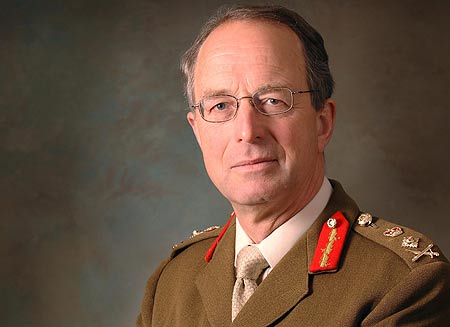
UK defense chief General Sir David Richards declared that, despite painful cuts in his country’s military budget, they "will continue to be the best ally the United States could hope for."
Richards made no bones about how painful austerity would be, noting that it will require manning a smaller force than he would like and giving up missions and weapons systems that, in an ideal world, he would fund. At the same time, however, he acknowledged that defense will take a far lesser hit than many important domestic programs and that "financial security" is as important as national security. And, Richards reminded us, the UK will continue to remain above the 2 percent of GDP spending threshold commitment required (if frequently unmet) of NATO members.
But he boldly declared that, despite the austerity with which the Alliance must cope, "This is not a time for strategic shrinkage."
Richards reiterated British determination that the decreased costs will not come at the price of decreased performance. The only way to accomplish this, UK defense leaders agreed at the outset, was to come up with "genuinely radical" solutions. Rather than doing many jobs badly, they undertook a comprehensive review in putting together a new National Security Strategy and fully funded the capabilities needed to do the most important missions, sacrificing systems and roles that would have been unimaginable fifteen years ago.
Nor will the UK’s become a specialized force, focusing only on counterterrorism or counterinsurgency or other "missions of today." Instead, the recent Strategic Defense and Security Review mandated an "Adaptable Force" capable of acting across the spectrum of conflict and across multiple domains of warfare. Not only will they be able to do traditional warfighting, counterinsurgency, counterterrorism, and maintain a robust nuclear deterrent — the last of which he declared "our ultimate guarantee of national sovereignty" — but also expand into new domains, including cyber.
In order to do this, they had to slash the budget for nice to have but ultimately outmoded major systems procurement and cut manpower well beyond what he would have preferred. But, again, Richards’ view is that it’s better to do fewer things well than more things poorly.
Additionally, as frequently noted in this space, Britain and France have responded to the current financial climate with an unprecedented — and until now unthinkable — degree of defense integration. Indeed, the fact that the two countries will have to share aircraft carriers prompted General Chuck Wald, a member of the Atlantic Council’s Board of Directors and its Strategic Advisors Group, to question how the UK will maintain its sovereignty. Richards acknowledged the concern but argued that, if done properly, it means that each country will effectively have "two aircraft carriers for the price of one."
James Joyner is managing editor of the Atlantic Council.
Image: david-richards.jpg
